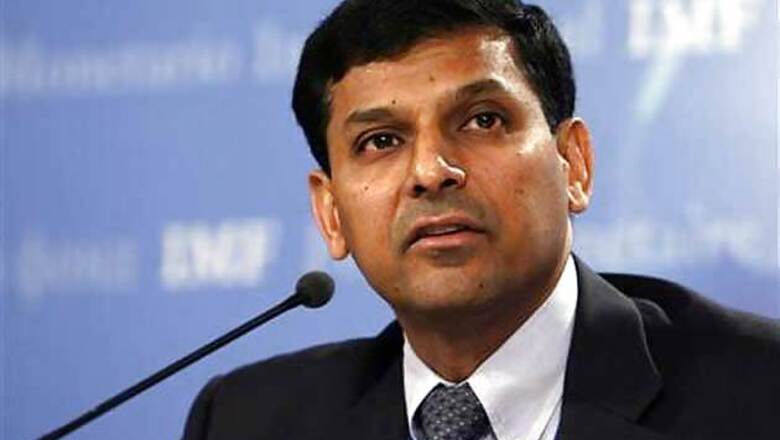
views
New Delhi: The man widely expected to be the next Reserve Bank of India (RBI) governor favours clipping the autocratic power of the role and giving more say to a monetary policy committee.
Raghuram Rajan, who in 2005 predicted the global financial crisis, also believes that inflation of around 5 per cent is "reasonable" in a developing economy, rejecting the notion of a "new normal" for India of 7-8 per cent.
That's a view shared by the RBI, which has struggled for years to curb inflation and a sign that Rajan would not radically alter the thrust of monetary policy.
Inflation has been stuck above 7 per cent for most of the past three years, limiting the central bank's ability to support economic growth as expansion slowed dramatically from more than 9 per cent in early 2011 to just 4.5 per cent in the December quarter of 2012.
India is an outlier in setting policy, with power vested solely in the governor. Giving more power to a committee would align the RBI more closely with other major central banks.
"I do think that broadening the policy-setting from being in the mind of the governor may, over time, bring a broader set of views and allow for more continuity," Rajan said during an interview in his office in New Delhi, where he is chief economic adviser to Finance Minister P Chidambaram.
The son of a diplomat father, Rajan, 50, has spent a large part of his life abroad, as chief economist at the International Monetary Fund and a professor at the University of Chicago, making him something of an outsider in the country of his birth.
Not shy about speaking his mind, Rajan confronted conventional wisdom with a paper in 2005 at a US meeting of central bankers, warning that financial sector developments could trigger an economic crisis. The argument was dismissed by many at the time as alarmist.
His current role, which he took up in August 2012, is widely viewed as a stopover on the way to Mumbai, where the central bank is located. RBI Governor Duvvuri Subbarao's term is due to lapse in September.
But he dismissed as "hypothetical" a suggestion he might become the next RBI governor. The search process has yet to begin and perceived front-runners in the past have not always landed the job.
When it comes to making policy decisions, Subbarao in practice does take the views of staff and an advisory committee on board. But he often goes against their advice, minutes of central bank meetings have shown.
Giving more power to a monetary policy committee was one proposal in a set of reforms suggested by a committee headed by Rajan in 2009. Subbarao opposes the idea, RBI insiders have said.
"When my committee proposed it, the idea was to get more continuity into the process, so that things did not necessarily change, when a new governor came in, by so much," Rajan said.
Still, others say India is not ready for a monetary policy committee, including Abheek Barua, chief economist at HDFC Bank, who says the pulls and pressures of a committee could dilute policymaking and erode the RBI's independence.
"I think we should slowly move to a committee type thing, but I don't think this is really the right time to do it. We need someone who can really crack the whip and get things done."
While inflation should be the central bank's main focus, growth and financial stability were also important, Rajan says.
"I think you can articulate again and again that you do stand for low inflation but that has to be seen in the context that you are making sure that you don't completely give up on either of the other two," he said.
His growth outlook of 6.1 to 6.7 per cent for the fiscal year starting in April 2013, contained in a report prepared for the government, is rosier than many private forecasts.
If he does move to the RBI, Rajan would be the first among recent RBI governors not to have spent a significant part of his career in Indian bureaucracy, an often-unwieldy apparatus with British-era vestiges that Rajan says can be "archaic". It includes, for example, a requirement that he needs the finance minister's permission to leave the capital.
"(I have to) adjust to this way of living, from academia in the US, where I don't tell even my wife where I'm going sometimes," he said, laughing.


















Comments
0 comment